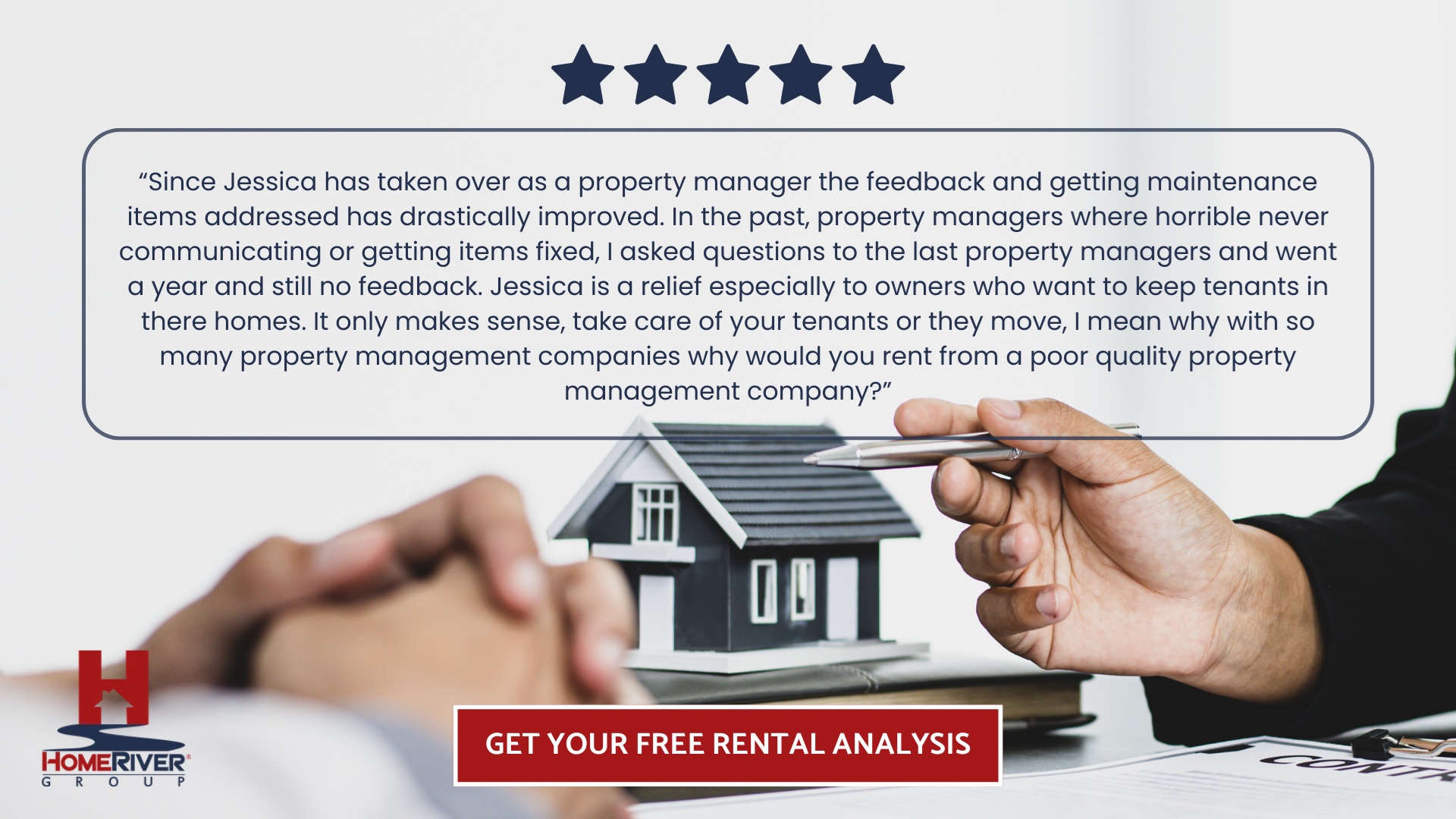
HomeRiver Group stands as a leader in property management, offering unmatched expertise and a commitment to maximizing rental property profitability. With a broad portfolio spanning multiple states, HomeRiver Group combines advanced technology with data-driven strategies to enhance rental income and minimize vacancies. Their dedicated team of professionals delivers exceptional service for both property owners and tenants, solidifying HomeRiver Group as the premier choice in property management.
When it comes to managing rental properties, homeowners and investors constantly seek ways to increase profitability and reduce expenses. A common question in property management and real estate investment is whether the value of an owner's own labor on a rental property can be deducted for tax purposes. This consideration is crucial for everyone, from individual property managers to large firms like HomeRiver Group.
In this article, we’ll explore the tax implications of personally performed labor on rental properties, clarify which expenses are deductible, and provide strategies to manage maintenance and improvements. By the end, you’ll gain valuable insights on maximizing both tax benefits and property value.
The Basics Of Rental Property Labor Costs
One key consideration when managing a rental property is the cost of maintaining and improving it. For many property owners, the question often arises: "Can you deduct your own labor on rental property?" Understanding the basics of rental property labor costs is crucial for effective property management and optimizing tax benefits.
Importance Of Maintenance And Improvements
Rental property maintenance and improvements are essential for keeping the property attractive to current and potential tenants, ensuring safety, and complying with local housing laws. The IRS allows property owners to deduct expenses that are ordinary and necessary for managing, conserving, or maintaining a rental property. These expenses typically include repairs, utilities, property taxes, insurance, and professional services.
Differentiating Repairs And Improvements
However, the tax rules differentiate between the types of work done on the property—repairs versus improvements. Repairs are considered work that keeps your property in good operating condition, such as fixing leaks, painting, or replacing broken fixtures. On the other hand, improvements add value to the property, prolong its life, or adapt it to new uses, like adding a room, renovating a kitchen, or installing a new roofing system.
Non-Deductibility Of Personal Labor
While the costs for materials and hired labor for repairs and improvements are generally deductible, the IRS does not allow property owners to deduct the value of their labor. Whether you spend several hours fixing a leak or days renovating a unit, the IRS views your labor as a personal expense, which is not deductible against your rental income. This rule applies even if the work you perform would have been costly if done by a professional.
Strategic Planning For Maintenance And Improvements
For property owners, this means planning and strategizing around maintenance and improvements. While you can't deduct the value of your own labor, you can still deduct other related expenses, such as materials and tools bought for the repair or improvement project. Keeping detailed records of these purchases is essential for maximizing deductions during tax time.
Making Informed Decisions
Understanding the basics of rental property labor costs can significantly impact how you approach property management tasks. Allocating funds for professional services for significant repairs or improvements can sometimes be more tax-efficient than doing the work yourself. Property owners can make informed decisions that benefit the property's condition and financial performance by factoring in the cost of materials and professional labor.
Can You Deduct Your Own Labor? IRS Stance
Understanding the specifics of tax deductions is critical for maximizing potential returns on your investment. A common question among rental property owners is whether they can deduct the value of their own labor when performing repairs and maintenance on their property. The IRS provides clear guidelines, which property owners must comprehend to ensure compliance and optimize their tax benefits.
IRS Guidelines: The IRS states that property owners cannot deduct the value of their labor when calculating rental property expenses.
Scope Of The Ruling: This ruling applies to direct family members who perform unpaid work on the property.
Rationale: The tax code allows deductions for expenses that can be quantified and verified, and personal labor does not incur a direct monetary cost, making it ineligible for deduction.
Deductible Materials: While personal labor is not deductible, any materials or supplies purchased for repairs or maintenance can be deducted.
Record Keeping: Maintaining detailed records of all purchases is essential for substantiating these deductions during tax filing.
Navigating Tax Deductions: Understanding IRS rules helps property owners identify other deductible expenses, contributing to minimizing tax liabilities and enhancing profitability.
Outsourced vs. DIY Repairs And Maintenance: Tax Implications
When dealing with rental property expenses, understanding the distinction between outsourcing repairs and maintenance and opting for a do-it-yourself (DIY) approach is critical, particularly from a tax perspective. The Internal Revenue Service (IRS) provides clear guidelines influencing how these expenses impact your tax liabilities and benefits. Property owners, renters, and buyers must grasp these nuances to optimize their financial strategies effectively.
Outsourced Services
Outsourced repairs and maintenance refer to any work done on the property by independent contractors or property management companies, such as HomeRiver Group. The cost of these services is fully deductible from your rental income, provided the expenses are ordinary, necessary, and directly related to the rental activity. This straightforward deduction doesn't require the property owner to allocate personal time to the expense equation. Furthermore, leveraging a property management company combines the advantage of professional service with the ease of documentation for tax purposes.
DIY Repairs And Maintenance
On the other hand, when property owners decide to undertake repairs and maintenance tasks themselves, the tax implications differ significantly. While the IRS allows deductions for the materials and supplies purchased directly for the repair or maintenance of rental property, it does not permit property owners to deduct the value of their labor. This rule stands regardless of how much time or expertise the owner invests in these activities.
The distinction emphasizes the IRS’s view on labor as a non-deductible personal expense when not outsourced. Consequently, owners who decide on a DIY approach must carefully consider the potential savings on labor costs and the absence of tax deductions for their time and effort. In some scenarios, this could nullify the financial benefit of opting to do the work themselves, especially when compared to the potential tax deductions available through outsourcing these tasks.
Strategic Decision-Making
For property owners, the decision between outsourced vs. DIY repairs and maintenance is not merely a matter of personal preference or skills. It requires a strategic examination of financial implications, including tax deductions and the potential for greater long-term savings and property value enhancement through professional services.
The Long-Term Impact of Deduction Strategies On Your Rental Business
While it's clear that owners cannot directly deduct the value of their own labor on rental properties, adopting a holistic approach to expense management and tax planning can offer substantial long-term benefits.
Enhanced Profit Margins
Properly managing deductible expenses, including maintenance costs incurred through hired labor, supplies, and professional services, can significantly reduce your taxable income. This strategic approach ensures that every dollar spent on your rental property works towards enhancing its value, operational efficiency, and profitability, ultimately reflecting positively on your profit margins.
Reinvestment Opportunities
Savings realized through effective tax strategies provide an opportunity to reinvest in your rental properties. This could mean upgrading current assets, expanding your portfolio, or increasing the property's market competitiveness through enhancements and modernizations. Each option contributes to long-term asset appreciation and strengthens the overall health of your rental business.
Building A Solid Financial Foundation
Implementing savvy deduction strategies as part of your business model aids in building a sustainable financial framework. Effective tax planning facilitates better cash flow management, allowing for a more predictable and stable financial outlook. This is crucial for addressing ongoing maintenance and operational needs, securing financing for future investments, or navigating economic downturns.
Establishing A Professional Reputation
A well-managed property portfolio, underscored by prudent financial and tax practices, positions your rental business as reliable and professional. This attracts quality tenants and fosters positive relationships with stakeholders, including investors, financial institutions, and local communities.
Mitigating Long-Term Risks
Effective deduction strategies also play a crucial role in mitigating risks associated with your rental business. You protect your personal and business assets by not absorbing unnecessary costs personally and instead leveraging all available legal avenues for expense deductions. This strategic approach reduces the risk of financial strain and ensures your business remains viable and competitive in the long term.
Expert Advice: When To Consult A Tax Professional
Navigating the complexities of tax deductions on your rental property can be daunting, especially when understanding whether you can deduct your labor. Misinterpreting tax laws can lead to significant consequences, including audits, penalties, and missed opportunities to optimize your tax savings. Recognizing when to seek the guidance of a tax professional is key to ensuring you comply with IRS regulations while maximizing your investment return.
When Dealing with Complex Rental Situations: Rental properties often involve multifaceted financial scenarios—depreciation, expenses, improvements versus repairs, and the nuances of passive activity losses. A tax professional can provide clarity and strategic planning specific to your situation.
To Stay Updated on Current Tax Laws: Tax codes evolve, and what was accurate last year may not apply today. Consulting with a tax advisor ensures your deductions are aligned with the latest tax laws, including any changes that might affect the deductibility of your own labor on a rental property.
When Your Time is Better Spent Elsewhere: As a property owner, your focus is best placed on managing and growing your portfolio. You can optimize operations and asset management by leveraging the expertise of HomeRiver Group’s national platform combined with local market knowledge. Similarly, allowing a tax professional to handle the intricacies of tax deductions allows you to invest your time where it has the most impact.
In Preparing for Audits: Audits are relatively rare but can be time-consuming and stressful. A tax professional can ensure your tax filings are audit-proof, providing peace of mind and significant savings in time and potential penalties.
For Peace of Mind: With HomeRiver Group, your property is our priority, which aligns with ensuring that every aspect of your investment, including tax handling, is managed with expertise. Consulting with a tax advisor offers reassurance that you make informed decisions regarding your rental property deductions.
Final Thoughts
When it comes to tax rules for rental properties, it is clear that owners cannot directly deduct the value of their own labor from their taxable income. Although this might seem like a missed opportunity for savings, it underscores the importance of understanding and navigating the tax code effectively to optimize the financial performance of your investment. Rather than deducting personal labor, focusing on legally permissible deductions—such as materials, hired labor, and other operational expenses—can significantly reduce your tax liability and enhance your property's profitability.
HomeRiver Group leverages its extensive experience and national reach to help property owners navigate these complexities. We are dedicated to ensuring your investment operates efficiently while maximizing its income and tax advantages.
Our comprehensive approach to property management and deep understanding of market-specific regulations means your property is in the best hands.
Read also:
Real Estate Asset Management Best Practices That Put Money in Your Pocket
Maximizing Profits: The Benefits of Using a Leasing Only Service for Landlords
5 Must-Have Tips for Conducting a Successful Rental Analysis
Frequently Asked Questions About Can You Deduct Your Own Labor On Rental Property
Is the value of personal labor tax-deductible for landlords?
No, the value of a landlord’s own labor is not tax-deductible. The IRS does not allow landlords to deduct the value of their time and labor on rental property maintenance or improvements.
What expenses can you deduct for a rental property?
Landlords can deduct various expenses for operating, maintaining, and managing a rental property. These include advertising, cleaning and maintenance, utilities, insurance, taxes, mortgage interest, professional property management services, and depreciation.
Can you write off renovations on a rental property?
Yes, you can write off renovations on a rental property, but not immediately as expenses in the year they are incurred. Instead, renovations are often classified as improvements and must be depreciated over the property's useful life as specified by IRS guidelines.
Do you need to hire a professional for repairs to deduct the cost?
No, you do not necessarily need to hire a professional for repairs to be deductible. Costs for materials and supplies can be deducted, regardless of who performs the work. However, only the actual costs for materials and hired labor (excluding your labor) are deductible.
How do you calculate labor costs for rental property repairs?
Labor costs for rental property repairs are calculated based on the invoices or receipts from the contractors or professionals you've hired. Your own labor as a landlord cannot be assigned a cost value for tax purposes.
Can you deduct your labor on a rental property for tax purposes?
As reiterated, landlords cannot deduct the value of their own labor on a rental property for tax purposes. Only out-of-pocket expenses for materials, supplies, and hired labor are deductible.










